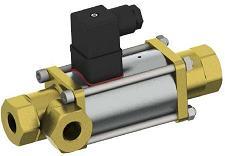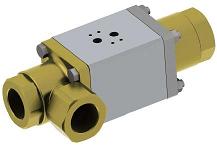
 Valves Home Valves Home  Technical Data Technical Data  Seal material Explained Seal material Explained UK Solenoid Valve supplier Basic Seal Guide.Solenoid Valve Seal and Diaphragm Material Selection.Selecting the correct sealing material for your solenoid valve requires an understanding of available sealing materials. Seals are usually the most limiting factor of a solenoid valve. The seal selection should take the following items into consideration:
The next sections describe the most common seal materials available for solenoid valves. Usually more than one seal material is available for each valve type. If you need more detailed information on chemical compatibility please contact us or your chemical supplier directly. Click Here for our solenoid valve chemical resistance chart. Solenoid Valve Nitrile Rubber (NBR / Buna-N)The chemical name for Nitrile rubber is Butadiene Acrylonitrile. However, most commonly it is referred to as NBR or Buna-N. NBR is probably the most common solenoid valve seal material and it is considered the standard material for neutral fluids by many. NBR is also the standard material for O-rings. NBR can stand media temperatures to approximately 90 degrees Celsius on continuous basis, and higher temperatures intermittently. NBR resists ageing caused by heat very well. However, NBR's resistance to sunlight is very poor. Abrasion and tear resistance of NBR is very good. NBR seals are most commonly used with the following media:
NBR has a good resistance to:
NBR has a poor resistance to:
In addition to solenoid valve seals, NBR rubber is often used for water pump, carburetor, transmission, hydraulic pump, and hydraulic actuator seals. Solenoid Valve EPDM RubberEPDM stands for Ethylene Propylene Diene Monomer rubber. EPDM solenoid valve seals are well suited for use with hot water due to EPDM's excellent resistance to heat. The maximum service temperature of EPDM is approximately 120 degrees Celsius. EPDM is unsuitable for use with most oils and fuels. EPDM seals are most commonly used with the following media:
EPDM has a good resistance to:
EPDM has a poor resistance to:
Solenoid Valve VitonŽ (FKM)VitonŽ (FKM) is a brand name for the Fluoroelastomer manufactured by DuPont. It is well know for its excellent heat resistance, making service temperatures nearing 150 degrees Celsius possible. FKM seals are most commonly used with the following media:
FKM has a good resistance to:
VitonŽ has a poor resistance to:
Solenoid Valve PTFE - PolytetrafluoroethylenePTFE is a Polytetrafluoroethylene. The most well know trademark of PTFE is DuPont's Teflon. PTFE is practically resistant to all fluids. PTFE is non-elastic, limiting its use in certain applications. PTFE can be used with media reaching very high temperatures 230 degrees Celsius. Connexion Developments Ltd have access to many other types of seal material including metal/metal and metal/Resin and FFKM amongst others for more aggressive and demanding applications. Please also keep in mind that apart from the dry armature valves in the Connexion Range most valves will have varying grades of stainless steel in contact with the media. i.e. 303 or 302 stainless steel springs, 304 stainless core tube and stainless steel 430F Armature. Please consult us its a free service we provide to help. Our solenoid valve technical sales team will be happy to help you please call 01454 334990 or Free Phone 0800 808 7799 Monday to Friday 0830 to 1800 GMT. Or go to our contact us page here. |
|

